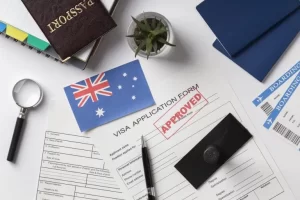Problem, Expertise, Promise
Are you feeling overwhelmed by the legal responsibilities that come with hiring an international worker on a skilled sponsored visa? If you’re a Managing Director, HR Manager, or General Manager in a regional Australian business, you’re not alone. The skills shortage has hit hard, and while hiring skilled workers from overseas is a great solution, understanding your legal obligations can be daunting.
As a recruiter and registered migration agent with over 20 years of experience, I understand the complexities involved. I’ve navigated these waters myself, both as an employer and as a recruiter. You Solved was born out of the frustration of dealing with the skills gap, and our mission is to make the hiring process seamless and successful for businesses like yours.
In this article, you will learn about your obligations as an employer of a sponsored visa holder, specifically for the sc482 and sc494 visas. We will break down the legal requirements in simple terms, provide practical tips for compliance, and help you avoid potential pitfalls. By the end, you’ll feel confident in managing your responsibilities and ensuring your business remains compliant.
Overview of Skilled Sponsored Visas (sc482 and sc494)
Understanding the types of visas available is crucial for meeting your obligations as an employer. Two common visas for skilled workers in Australia are the Temporary Skill Shortage (TSS) visa (subclass 482) and the Skilled Employer Sponsored Regional (Provisional) visa (subclass 494).
The TSS visa (sc482) allows Australian employers to fill labour shortages with skilled workers from overseas. It includes short-term and medium-term streams, allowing stays of up to two or four years, respectively, with a pathway to permanent residency in some cases.
The sc494 visa is designed for employers in regional Australia to address skills shortages. It allows workers to live, work, and study in regional areas for up to five years, with a pathway to permanent residency after three years.
For regional Australian businesses, these visas provide a vital lifeline to fill gaps with skilled workers, ensuring that businesses can continue to operate effectively and grow. Understanding the specifics of these visas will help you better navigate your legal obligations and support your sponsored employees.
Obligations for Employers of sc482 and sc494 Visa Holders
When hiring workers on skilled sponsored visas, such as the Temporary Skill Shortage (TSS) visa (subclass 482) and the Skilled Employer Sponsored Regional (Provisional) visa (subclass 494), it’s essential to comply with specific legal obligations to avoid repercussions. Understanding these responsibilities will help ensure a smooth employment process and compliance with Australian migration laws.
Sponsorship Obligations
As an approved sponsor, you must meet several obligations for both sc482 and sc494 visa holders:
- Providing Equivalent Terms and Conditions: Ensure that the sponsored employee receives terms and conditions of employment that are no less favourable than those provided to an Australian citizen or permanent resident performing equivalent work. This includes paying a salary that meets or exceeds the Temporary Skilled Migration Income Threshold (TSMIT).
- Ensuring the Employee Works in the Nominated Position: The visa holder must work only in the position for which they were nominated. This position should match the nominated occupation and duties specified in the visa application. Any substantial change in duties requires notification to the Department of Home Affairs and, in some cases, a new nomination.
- Covering Travel Costs: You are responsible for covering the cost of the employee’s return travel to their home country if they cease employment. This must be provided within 30 days of receiving a written request from the employee or the Department of Home Affairs.
Additional Obligations for sc494 Visa Holders
For the sc494 visa, there are additional regional-specific obligations:
- Regional Employment Requirement: The employee must work in a designated regional area of Australia. Ensure that the work location complies with the regional requirements specified in the visa conditions.
Monitoring and Reporting
Timely and accurate reporting is crucial to maintaining compliance. You must notify the Department of Home Affairs within 28 days if:
- The Employee’s Employment Ends: Whether the employment ends voluntarily or involuntarily, you must report the termination to the Department.
- Changes in Employment Conditions: Any changes in the employee’s role, duties, work location, or salary must be reported.
- Business Changes: If your business undergoes significant changes, such as restructuring, sale, or closure, this must be reported.
Record Keeping
Maintaining detailed records is essential for compliance and future audits. Ensure you keep:
- Employment Contracts and Agreements: Document the terms and conditions agreed upon with the sponsored employee.
- Job Descriptions: Maintain clear and updated job descriptions that align with the nominated occupation.
- Salary Records: Keep detailed records of salary payments to ensure they meet the required thresholds.
- Regional Employment Proof: Maintain evidence that the employee is working in a designated regional area (for sc494 visa holders).
- Reporting Documentation: Save copies of all notifications and reports sent to the Department of Home Affairs.
By fulfilling these specific obligations for both sc482 and sc494 visa holders, you ensure a lawful and smooth employment process, minimising the risk of penalties and ensuring the success of your skilled workforce.
Penalties for Non-Compliance
Failing to meet your obligations as an employer of sponsored visa holders can have serious consequences. Understanding these penalties helps ensure you remain compliant and avoid legal and financial repercussions.
Legal Consequences
Non-compliance with the Migration Regulations can result in significant legal penalties. These include:
- Cancellation of Sponsorship Approval: If you fail to meet your sponsorship obligations, the Department of Home Affairs may cancel your approval as a sponsor. This means you will no longer be able to sponsor skilled workers under the TSS (sc482) or SESR (sc494) visa programs.
- Visa Cancellation for Employees: Non-compliance can also lead to the cancellation of your employee’s visa, disrupting your workforce and leaving you without the skilled labour you need.
Financial Penalties
Financial penalties for non-compliance can be substantial. These include:
- Infringement Notices: The Department of Home Affairs can issue infringement notices for breaches of sponsorship obligations. These notices carry fines that vary depending on the severity and nature of the breach.
- Civil Penalties: For more serious breaches, the Department can take civil action, resulting in significant fines. These fines can reach up to $63,000 for corporations and $12,600 for individuals per breach.
Reputational Damage
Beyond legal and financial penalties, non-compliance can severely damage your business’s reputation. This can impact your ability to attract skilled workers in the future and damage relationships with clients and partners. Maintaining compliance demonstrates your commitment to fair and lawful employment practices, enhancing your reputation and business success.
Case Studies/Examples
Understanding real-world examples can illustrate the importance of compliance:
- Case Study 1: Sponsorship Cancellation: A regional business failed to notify the Department of Home Affairs about changes in their sponsored employee’s job duties. The Department discovered this during an audit, leading to the cancellation of the company’s sponsorship approval and the employee’s visa. This left the business without a crucial team member and the ability to sponsor new workers.
- Case Study 2: Financial Penalties: An employer paid their sponsored workers below the Temporary Skilled Migration Income Threshold (TSMIT). Upon investigation, the Department issued infringement notices and civil penalties, costing the company over $100,000 in fines. Additionally, the company faced significant reputational damage in their local community.
By understanding and adhering to your obligations as an employer of sponsored visa holders, you can avoid these severe penalties and ensure a smooth, compliant, and successful employment process.
Practical Tips for Compliance
Ensuring compliance with your obligations as an employer of sponsored visa holders can seem daunting, but following practical tips can simplify the process and help you avoid penalties.
Stay Informed
Keep up to date with the latest immigration laws and regulations. Regularly review updates from the Department of Home Affairs and consider subscribing to newsletters or alerts that provide information on changes to visa conditions and employer obligations.
Create a Compliance Checklist
Develop a checklist that outlines all your obligations as an employer of sponsored visa holders. Include items such as:
- Ensuring job roles match the nominated occupation
- Monitoring salary payments to meet the TSMIT
- Keeping records of employment contracts and changes
- Reporting changes to the Department of Home Affairs within 28 days
Implement Robust Record-Keeping Practices
Maintain thorough and organised records of all relevant documents, including:
- Employment contracts and job descriptions
- Salary payment records
- Copies of notifications and reports sent to the Department of Home Affairs
- Evidence of regional employment for sc494 visa holders
These records should be easily accessible for inspections or audits.
Conduct Regular Internal Audits
Periodically review your compliance with sponsorship obligations. Conduct internal audits to ensure all aspects of your employment practices align with the requirements. Address any discrepancies immediately to prevent non-compliance issues.
Provide Training for HR Staff
Ensure your HR team is well-versed in the legal obligations associated with employing sponsored visa holders. Provide training sessions that cover:
- The specific requirements of sc482 and sc494 visas
- Reporting and monitoring obligations
- Record-keeping best practices
Use Professional Services for External Audits
Consider engaging with migration agents or legal professionals who specialise in employer-sponsored visa compliance. They can provide expert advice, help navigate complex regulations, and ensure you meet all your obligations.
Communicate with Your Sponsored Employees
Maintain open lines of communication with your sponsored employees. Ensure they understand the terms of their visa and their own obligations. Encourage them to notify you of any changes that might affect their visa status, such as changes in their personal circumstances or employment conditions.
Leverage Technology
Utilise software and tools designed for HR compliance management. These tools can help automate record-keeping, alert you to important deadlines, and streamline reporting processes, making it easier to stay compliant.
By following these practical tips, you can effectively manage your obligations as an employer of sponsored visa holders, ensuring a smooth and compliant process that benefits both your business and your employees.
Staying Informed
Navigating the legal obligations of employing sponsored visa holders can be challenging, but understanding and adhering to these requirements is crucial for ensuring compliance and avoiding penalties. As a regional Australian business, taking the steps to hire skilled international workers through the sc482 and sc494 visa programs can significantly benefit your operations, but it requires careful attention to detail and ongoing commitment to your responsibilities as an employer.
By staying informed about the latest regulations, maintaining thorough records, conducting regular audits, and leveraging professional services, you can confidently meet your obligations and foster a successful working relationship with your sponsored employees. Practical strategies like creating a compliance checklist, training your HR staff, and using technology to streamline processes will further support your compliance efforts.
At You Solved, we understand the complexities involved in hiring and managing sponsored visa holders. With our extensive experience in recruitment and migration, we are here to guide you every step of the way. By following the guidelines and tips outlined in this article, you can ensure a lawful and smooth employment process, helping your business thrive with the skilled workforce it needs.
If you have any questions or need further assistance, don’t hesitate to reach out to us. We’re here to help you navigate the intricacies of the employer-sponsored visa process and ensure your business remains compliant and successful.
If you are considering embarking on hiring an international worker our ultimate checklist in a great place to start.








